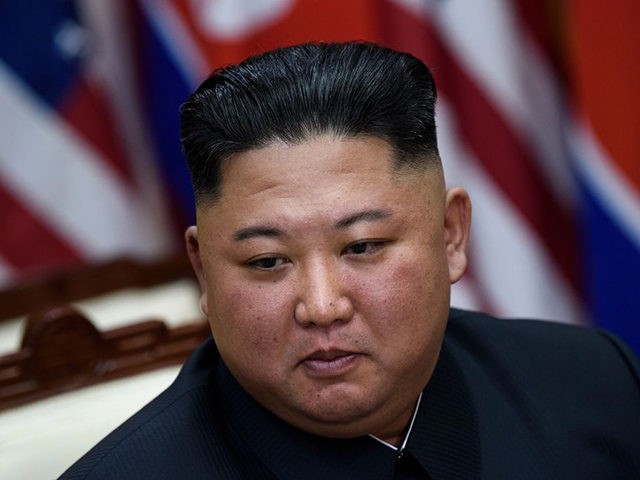North Korean leader Kim Jong-un visited a cemetery honoring Chinese veterans of the Korean War on October 21. The commemoration was widely viewed as part of Kim’s recent efforts to move closer to Beijing, where Chinese leader Xi Jinping on October 19 also honored the 70th anniversary of China’s entry into the conflict.
Kim visited the cemetery, located in Hoechang County, South Phyongan Province, for a wreath-laying ceremony to honor the anniversary. The Chinese ambassador to North Korea, Li Jinjun, attended the ceremony, along with several other North Korean government officials.
“A floral basket sent by Xi Jinping, general secretary of the Central Committee of the Communist Party of China (CPC) … was placed at the monument to the martyrs of the CPV,” the North Korean news site KCNA Watch reported. CPV refers to the Chinese People’s Volunteer (CPV) army, Beijing’s official name for the body of troops it deployed to aid North Korea in the war.
Kim spoke at the ceremony, paying tribute to China’s contribution to North Korean efforts during the conflict:
[T]he immortal exploits and heroic feats made by the CPV by sacrificially supporting us under the banner of resisting America and aiding Korea, safeguarding the home and defending the motherland despite the very difficult situation remain vividly in the memory of our people.
The Korean War began in June 1950 after North Korea invaded the south. China entered the war in support of Pyongyang in October 1950. The active portion of the conflict lasted until July 1953, when an armistice ended active fighting, though neither side agreed to the peace treaty. The Korean War is still technically ongoing today.
At Wednesday’s ceremony, Kim visited the grave of Mao Anying, the eldest son of the late Chairman Mao Zedong, leader of China’s Communist Revolution (1948-1952) and founder of the People’s Republic of China.
“A floral basket in the name of Kim Jong Un was placed before the grave of Mao Anying,” North Korea’s state-run newspaper Rodong Sinum reported. “Written on the ribbon of the floral basket were letters ‘To Martyr Mao Anying!'”
Mao Anying joined Chinese forces supporting Pyongyang in the Korean War and was killed by a U.S. airstrike in November 1950 while fighting. He was subsequently buried in North Korea. The younger Mao’s legacy has since been co-opted by both Pyongyang and Beijing, who have spun his early death at the age of 28 into a patriotic tale of sacrifice for one’s country in the face of imperialist aggression.
Pyongyang honored Mao and his gravesite in the country as an enduring symbol of North Korea’s historic link with China. In commemorating this year’s 70th anniversary of Beijing’s decision to enter the Korean War, state broadcaster China Central Television (CCTV) produced a documentary featuring Mao Anying’s widow, Liu Siqi, who provided a first-hand account of his departure to fight in support of North Korea. The film portrays Mao’s decision to leave his young bride for the battlefield as a heroic sacrifice made to protect his country’s sovereignty.
In recent years, China has recalibrated its official narrative of Beijing’s decision to enter the Korean War. The Communist Party previously framed the decision as Beijing’s effort to show solidarity with its socialist neighbor, North Korea. CPC leaders now portray Beijing’s entry into the conflict as a necessary action to protect Chinese sovereignty from the “invasive forces” of the U.S. The narrative shift has coincided with China’s increasingly strained relations with the U.S.
Kim’s symbolic visit to the Chinese veterans’ cemetery this week coincided with his pledge on Monday to enhance Pyongyang’s relationship with Beijing.
“Kim said he would make positive efforts with Chinese President Xi Jinping to ‘further consolidate and develop the traditional DPRK-China friendly relations,’” North Korea’s state-run Korean Central News Agency (KCNA) reported. DPRK is the initialism for the North’s official name, the Democratic People’s Republic of Korea.
Kim’s remarks on Monday were made in a reply message to Xi, who sent him a congratulatory letter earlier this month in honor of the 75th anniversary of the founding of North Korea’s ruling Workers’ Party.
“Xi expressed China’s intent to ‘successfully defend, consolidate and develop’ the bilateral relations” between Beijing and Pyongyang in his letter to Kim, according to KCNA.
Heavily sanctioned for its nuclear arms proliferation, North Korea relies upon China for essential imports, including food, fuel, and weapons. This reliance allows Beijing to wield considerable influence in Pyongyang.
North Korea on October 10 showcased a new intercontinental ballistic missile during a military parade marking the 75th founding anniversary of the Workers’ Party. The missile is capable of striking any part of the continental U.S., according to Pyongyang.

COMMENTS
Please let us know if you're having issues with commenting.